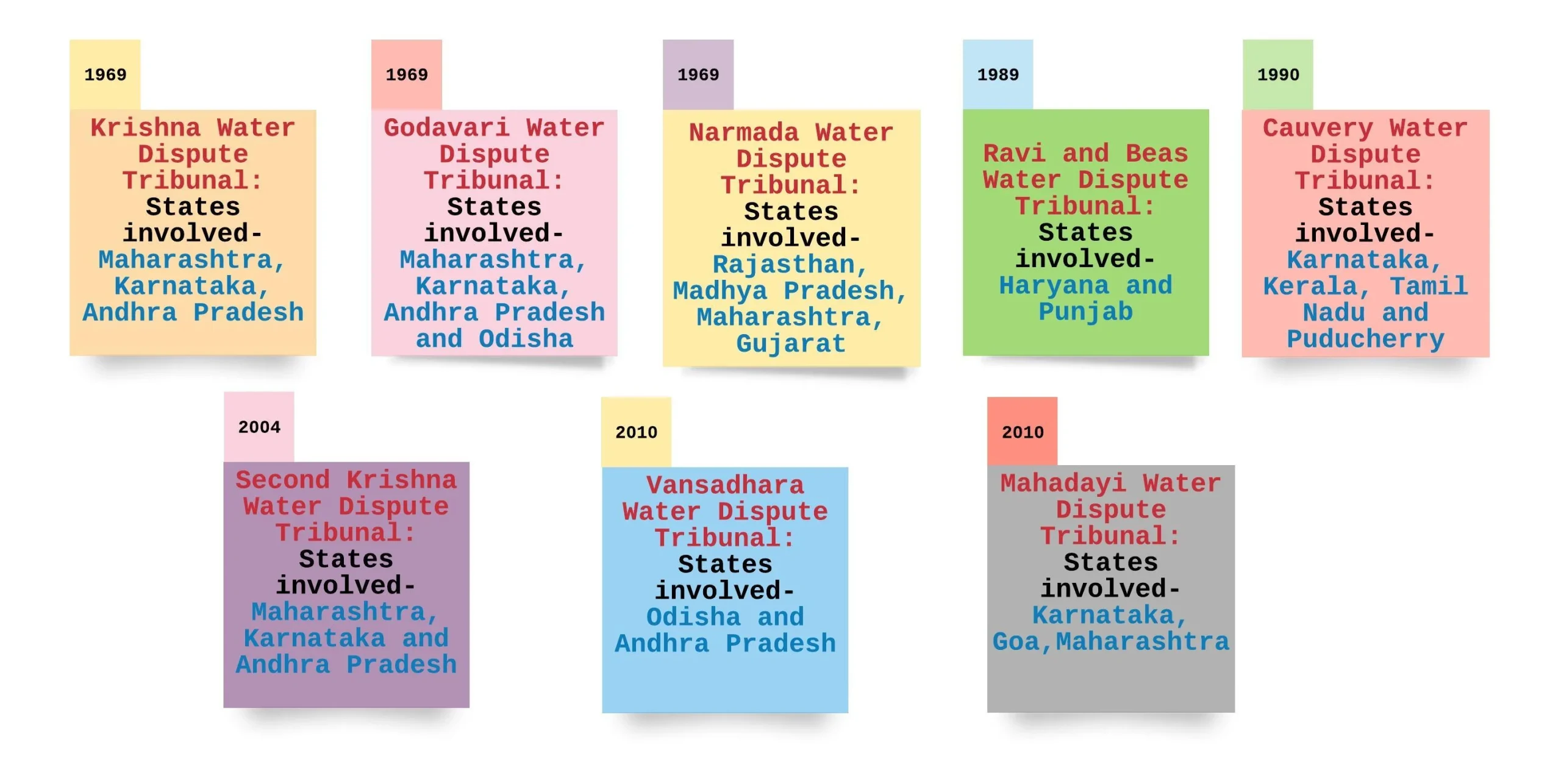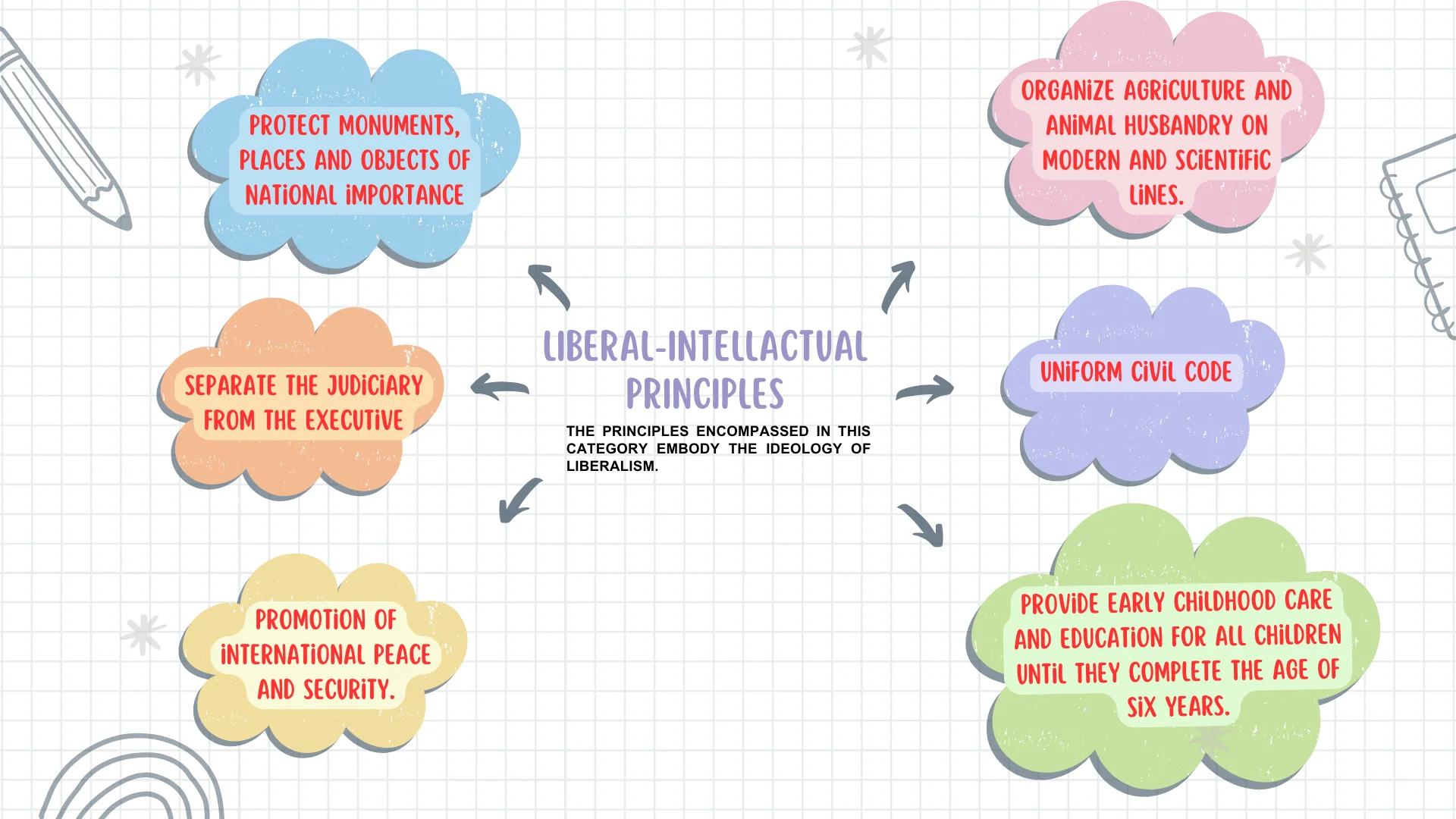Inter-State water disputes have been a persistent issue in India, leading to conflicts between States over river water sharing. To address these disputes, various legislative measures and amendments have been introduced, including the Inter-State River Water Disputes (Amendment) Bill, 2019. This Bill aims to streamline the adjudication process and strengthen the institutional framework for resolving these disputes, ensuring efficient and fair management of water resources.
Inter-State Water Disputes
Inter-State River Water Disputes (Amendment) Bill, 2019
- Aim: Amend the existing Inter-State River Water Disputes Act, 1956, with a view to streamlining the adjudication of inter-State river water disputes and making the institutional architecture more robust.
- Dispute Resolution Committee (DRC):
- Establishment: Central government will establish a Disputes Resolution Committee (DRC) whenever a State raises a dispute concerning inter-State river waters.
- The DRC will be tasked with resolving the dispute amicably through negotiations.
- Composition: The DRC will comprise a chairperson, nominated by the Central government, and experts with at least 15 years of experience in relevant sectors, also nominated by the Central government.
- Each State involved in the dispute will nominate one member from among its Joint Secretaries to serve on the DRC.
- Dispute Resolution through negotiations within a period of one year, with an extension of six months permissible under exceptional circumstances.
- Upon reaching a resolution, the DRC will submit a report outlining the details of the settlement to the Central government.
- Referral to Tribunal: If the DRC fails to resolve the dispute, the Central government will refer the matter to the Inter-State River Water Disputes Tribunal for adjudication.
- This referral must be made within three months of receiving the DRC’s report.
- Establishment: Central government will establish a Disputes Resolution Committee (DRC) whenever a State raises a dispute concerning inter-State river waters.
Enroll now for UPSC Online Course
- Inter-State River Water Disputes Tribunal:
- Establishment of a Single Tribunal: The Inter-State River Water Disputes (Amendment) Bill, 2019, proposes the establishment of a single Inter-State River Water Disputes Tribunal, empowered to adjudicate inter-State river water disputes.
- Operational Flexibility: This Tribunal will have the flexibility to operate through multiple benches to efficiently handle the volume of pending cases.
- Departure from the Current System: The creation of a unified Tribunal marks a departure from the current system of multiple Tribunals, each dedicated to specific inter-State river disputes.
- Objectives of Tribunal Consolidation: This consolidation aims to streamline adjudication processes, ensure consistency in legal principles, and expedite the resolution of water disputes.

- Time Period:
- Original Timeframe: The Inter-State River Water Disputes Act, 1956, mandates the Tribunal to deliver its decision within three years, with an extension of two years possible under certain circumstances.
- Proposed Timeframe Changes in the 2019 Amendment Bill: The Inter-State River Water Disputes (Amendment) Bill, 2019, proposes to shorten the initial time frame to two years, with an additional one-year extension permissible.
- Revised Timeframe: Regarding matters referred back to the Tribunal for further consideration, the existing act stipulates a one-year timeframe for submitting a report, with the option of an extension granted by the Central government.
- Limitations on Extension Periods: The amendment bill limits this extension to a maximum of six months.
- Original Timeframe: The Inter-State River Water Disputes Act, 1956, mandates the Tribunal to deliver its decision within three years, with an extension of two years possible under certain circumstances.
- Decision of the Tribunal:
- Publication of Tribunal’s Decision under the 1956 Act: Under the Inter-State River Water Disputes Act, 1956, the Tribunal’s decision must be published in the official gazette by the Central government.
- This decision carries the same weight as an order of the Supreme Court.
- Changes Introduced by the 2019 Amendment Bill: The Inter-State River Water Disputes (Amendment) Bill, 2019, removes the requirement for such publication.
- Instead, it stipulates that the decision of the Tribunal Bench will be final and binding on the parties involved in the dispute.
- Implementation Scheme: The original act allowed the Central government to make a scheme to implement the Tribunal’s decision.
- The amendment bill mandates the Central government to make such a scheme.
- This shift from optional to mandatory reflects the government’s commitment to ensuring that Tribunal decisions are effectively implemented.
- Data Bank:
- Central Government’s Responsibility: Under the Inter-State River Water Disputes Act, 1956, the Central government is responsible for maintaining a data bank and information system at the national level for each river basin.
- Modification Introduced by the 2019 Amendment Bill: The Inter-State River Water Disputes (Amendment) Bill, 2019, introduces an important modification by granting the Central government the authority to appoint or authorise an agency to manage this data bank.
- Delegation of Data Management: This provision allows the Central government to delegate the task of data management to a specialised agency, potentially enhancing the efficiency and effectiveness of data collection, storage, and dissemination.
The River Basin Management Bill
- Objective: The River Basin Management Bill aims to optimise the development and management of inter-State rivers by promoting inter-State cooperation and adopting a basin-level approach to land and water resource planning.
- Holistic Approach: This holistic approach encompasses all forms of water, including soil moisture, groundwater, and surface water, ensuring the comprehensive and balanced development of both catchment and command areas.
- Establishment of River Basin Authorities: The draft bill proposes the establishment of 13 River Basin Authorities for various river basins across the country.
Mihir Shah Panel Recommendations
- Recommendations of the Mihir Shah Panel: The Mihir Shah Panel, constituted to assess the State of water management in India, has proposed a series of far-reaching recommendations aimed at strengthening the institutional framework and promoting sustainable water resource utilisation.
- Restructuring of Central Water Institutions: The panel advocates for restructuring the Central Water Commission (CWC) and the Central Ground Water Board (CGWB) to enhance their efficiency and effectiveness.
- National Water Commission: It also recommends establishing a National Water Commission as the apex body responsible for water policy, data management, and governance for water management across the country.
- Regulating Industrial Water Usage: The panel proposes to bring industrial water under the purview of the National Water Commission.
- This move aims to ensure that industrial water use is regulated and accounted for within the overall water management framework.
- Water as a Common Property Resource: The panel emphasises that water is a common property resource, not owned by individual landowners.
- This recognition underscores the need for collective responsibility in managing and protecting water resources.
- River Basin Planning: The panel advocates for adopting a river basin approach to water management, recognizing the interconnectedness between aquifers, groundwater, and river flows.
- This approach promotes integrated planning and resource allocation at the basin level.
- Participatory Water Management: This approach involves involving communities and stakeholders in decision-making processes, fostering a sense of ownership and shared responsibility for water management.
National Commission to Review the Working of the Constitution (NCRWC) Recommendations
Central Legislation on River Boards: The NCRWC has also recommended enacting comprehensive Central legislation to define the constitution and jurisdiction of river boards, empowering them to regulate, develop, and control all inter-state rivers.
- Need for a Clear Legal Framework: This recommendation highlights the need for a clear legal framework to govern inter-State water management.

Enroll now for UPSC Online Course
| Must Read | |
| Current Affairs | Editorial Analysis |
| Upsc Notes | Upsc Blogs |
| NCERT Notes | Free Main Answer Writing |
Conclusion
Efforts to address inter-State water disputes, such as the Inter-State River Water Disputes (Amendment) Bill, 2019, and the proposed River Basin Management Bill, highlight the importance of cooperation and comprehensive planning.
- The recommendations by the Mihir Shah Panel and the NCRWC further emphasize the need for sustainable and participatory water management practices.
- Implementing these measures can foster harmonious and effective management of India’s vital water resources.
Sign up for the PWOnlyIAS Online Course by Physics Wallah and start your journey to IAS success today!
| Related Articles | |
| Inter-State Water Disputes Resolution | Dynamic Groundwater Resource Assessment Report 2023 |
| Water Management: How Can India Balance Its Water Demand and Supply? | Supreme Court of India |

 GS Foundation
GS Foundation Optional Course
Optional Course Combo Courses
Combo Courses Degree Program
Degree Program










